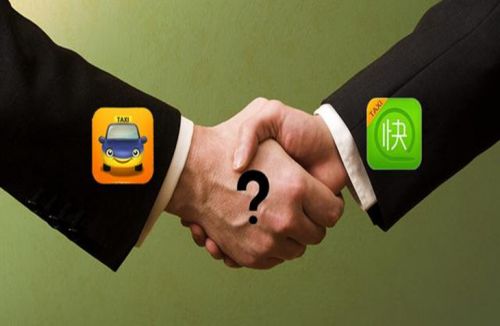(单词翻译:单击)
Chinese internet groups Alibaba and Tencent have put aside fierce rivalry to merge their popular taxi-hailing applications.
中国互联网集团阿里巴巴(Alibaba)和腾讯(Tencent)搁置了彼此间的激烈竞争,合并了各自旗下广受欢迎的打车软件。
Alibaba-backed Kuaidi Dache and Tencent’s Didi Dache said over the weekend they had completed a ‘strategic merger’ that leaves the two app companies operationally independent and leaves keeps both chief executives in place.
周末,阿里巴巴投资的快的打车(Kuaidi Dache)和腾讯旗下的滴滴打车(Didi Dache)表示,双方已完成“战略合并”。合并完成后,两家应用公司的运营将保持独立,两位首席执行官仍将留任。

The combined company would be worth about $6bn, local media calculate based on recent fundraisings. Last month, Kuaidi Dache raised $600m from Japanese telecoms group Softbank and existing shareholders while Didi Dache raised $700m in December.
中国国内媒体根据近期融资数据计算得出,合并后的企业市值将达到大约60亿美元。上个月,快的打车曾经从日本电信集团软银(Softbank)及现有股东处筹得6亿美元。而滴滴打车也曾在2014年12月筹得7亿美元。
The two firms are neck-and-neck in China’s competitive market, with the potential for expanding mobile payment systems the prize for their backers. Kuaidi Dache (“Speedy taxi”) had 54.4 per cent market share in China as of the third quarter, while Didi Dache (“Honk Honk Taxi”) had 44.9 per cent market, according to Analysys International, a research group.
在竞争激烈的中国打车软件市场上,这两家企业并驾齐驱。对于它们的投资方来说,它们的一大吸引力是可以扩大其移动支付系统的市场份额。根据研究机构易观国际(Analysys International)的数据,快的打车占有中国打车软件市场54.4%的份额,而滴滴打车占有44.9%的份额。
Although China has a series of anti-trust anti trust regulations, they have rarely been applied to major domestic companies, either state-owned or private.
虽然中国有一系列反垄断监管规定,但是它们很少被用于重要的中国企业——不论是国企还是民企。
The two gave no detail on how they are defining a merger that entails few obvious synergies and a high degree of de facto independence.
这两家企业几乎没有明显协同效应,事实上还将保持高度独立性,也都没有给出此次“合并”的细节。
“The combined company expects to conduct the businesses of Kuaidi and Didi independently under separate brands. The co-CEOs are especially grateful to the company’s shareholders for their support of the company’s independent operations,” the two companies said in a statement.
它们在一份声明中称:“两家公司在人员架构上保持不变,业务继续平行发展,并将保留各自的品牌和业务独立性。两位联合CEO也特别感谢双方股东都继续支持新公司独立自主的治理模式。”
The duo use two incompatible payment systems: Kuaidi Dache has Alibaba’s Alipay, and Didi Dache uses Tencent’s mobile payment system. Their announcement did not say which system they would adopt, or whether they would in future accept both systems.
目前,两家企业使用的是互不兼容的支付系统:快的打车使用的是阿里巴巴旗下的支付宝(Alipay),而滴滴打车使用的则是腾讯的移动支付系统。它们在声明中并未表示会采用哪种支付系统,也未指出未来是否会同时采用两种支付系统。
In December, China’s third big Internet firm Baidu agreed to buy into US-based taxi-hailing app Uber, whose roll-out has proven controversial in many countries including China.
2014年12月,中国第三大互联网公司百度(Baidu)曾达成协议,买入美国打车应用优步(Uber)部分股份。此前,在包括中国在内的许多国家,优步的推广都曾引发很大争议。
The three Internet giants each have a regional power base — Tencent in the south, Alibaba in the Yangtze Delta and Baidu in Beijing — and a history of backing very similar but rival products.
上述三家互联网巨头,每家都有影响力更大的“根据地”:腾讯在中国南方、阿里巴巴在长江三角洲、百度在北京一带。历史上,三家公司时常会投资于雷同而又竞争的产品。
Taxi-hailing apps are extremely popular in China’s largest cities, where rush-hour taxis are so hard to find that unlicensed cabs run a thriving business. Regulators have cracked down on private cars using apps in a bid to protect state-regulated taxi companies whose fares are capped. Many of China’s largest taxi companies are ultimately owned by municipal government entities.
打车应用在中国一线城市具有很高人气。在这些城市的高峰时段,人们很难叫到出租车,这种状况甚至带旺了这些城市的无牌出租车。目前,监管机构在大力打击使用打车应用的私家车,以保护受政府监管、车费有上限的出租车公司。在中国,许多规模最大的出租车公司,最终都是由市政府的下属机构控股。


